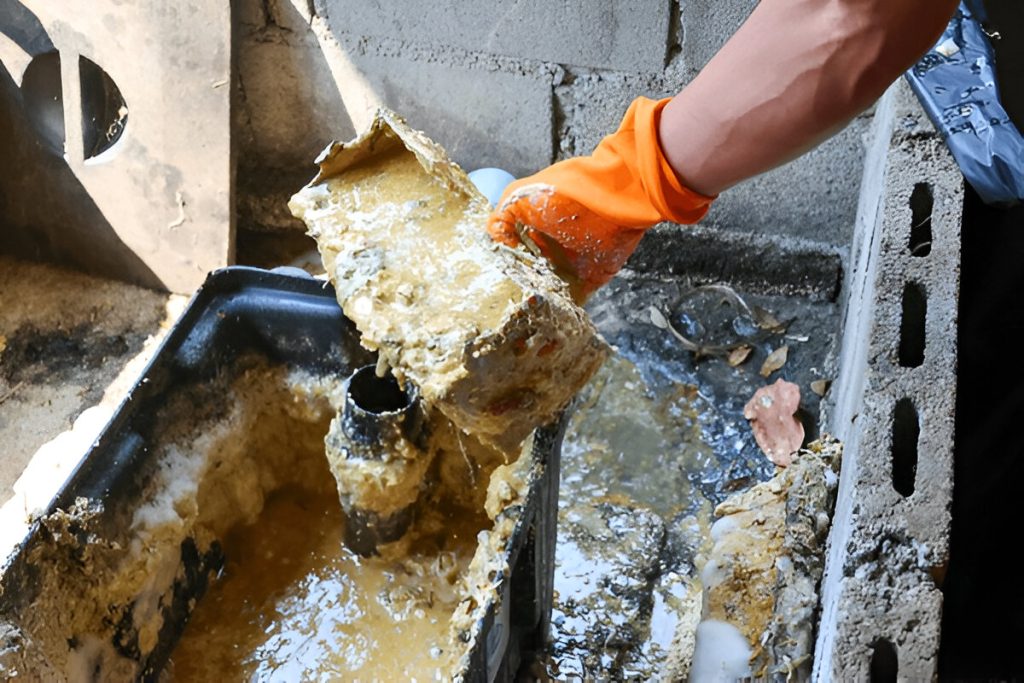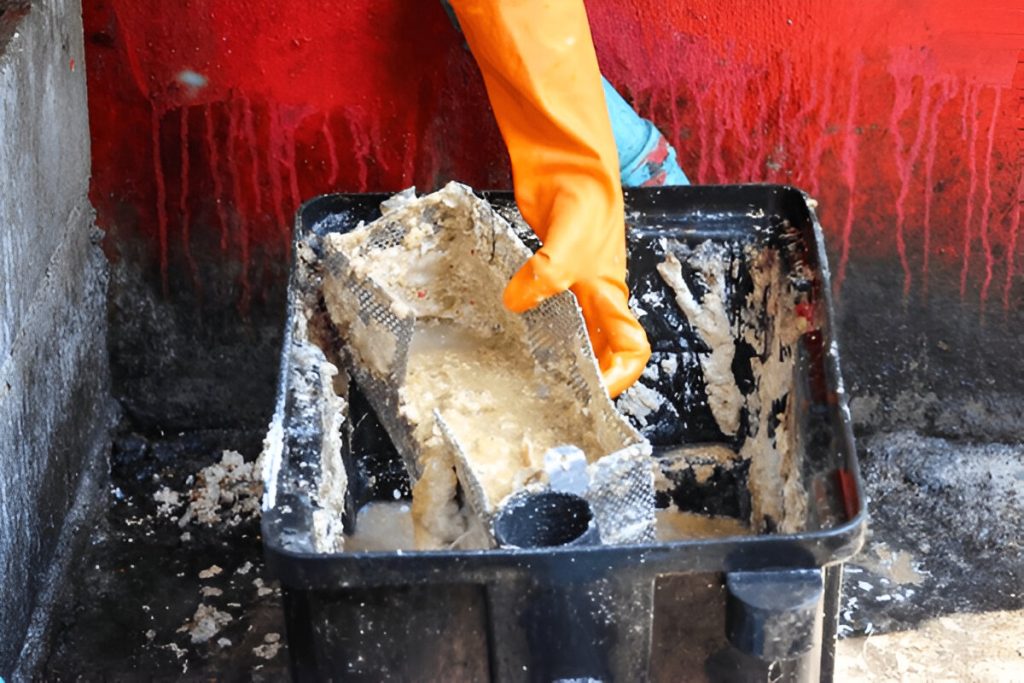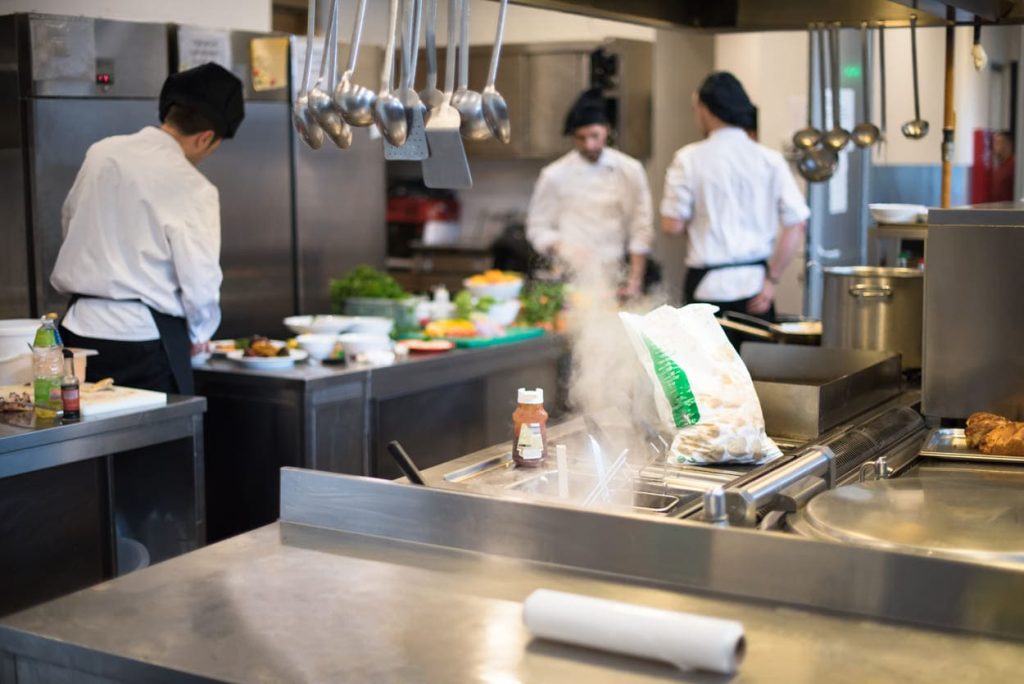Chicago Hood Cleaning
Grease Trap Cleaning in Eola, IL
Rated 5 stars on Google

Avoid These Grease Trap Problems in Your Business
Grease traps can cause big problems when they aren’t cleaned regularly. We help business owners in [location] avoid these grease trap headaches.
Unpleasant Odors
Old grease smells awful. If your kitchen has a constant odor, it might be coming from a full or clogged grease trap.
Clogged Drains
Full grease traps lead to slow draining sinks. Slow drains are a common problem caused by a full grease trap.
Health Code Violations
Dirty grease traps can result in serious violations during health inspections. If yours is full or leaking, you could face fines or even be shut down.
Grease Spills into Your Kitchen
When a trap overflows, it can send grease into your floors or drains. An overflowing grease trap makes your kitchen a hazardous place to work.
Higher Plumbing Costs
Grease buildup leads to clogs in your main line. Fixing that can be costly.
Displeased Employees and Customers
An unclean grease trap can lead to a frustrating, unhealthy environment for everyone. A clean grease trap helps keep your kitchen running smooth and pleasant.
Why Choose Us for Vent Hood Cleaning in Eola

Experienced Professionals
We’ve been in the business for years, offering expert grease trap cleaning services. Our team is highly trained to handle grease buildup and prevent common kitchen issues, ensuring your kitchen stays clean and operational.

Health Code
Compliant
We ensure your grease traps are up to code. Regular cleaning prevents violations and fines, so you can avoid costly problems and keep your kitchen in top shape for health inspections.

Prompt and Reliable Service
We understand the importance of keeping your kitchen running smoothly. That's why we offer fast, reliable grease trap cleaning services that won’t disrupt your business. We'll work around your schedule to minimize downtime.

Grease Trap Cleaning Solutions for Your Eola Kitchen
As a business owner, you rely on your kitchen to run smoothly. But there’s one part of your kitchen that can easily be overlooked—the grease trap. While it’s out of sight, a grease trap can cause serious issues.
Understanding Grease Trap Cleaning
Grease trap cleaning involves removing the buildup of grease and food waste from your kitchen’s grease trap. This is an essential maintenance task that keeps your kitchen running efficiently, prevents odors, and ensures that your kitchen is safe and up to code.
The Importance of Grease Trap Cleaning
A neglected grease trap can cause expensive issues down the line. Regular cleaning helps avoid costly repairs and ensures your kitchen meets health and safety standards.
Problems You Can Solve with Grease Trap Cleaning in Eola
When you don’t clean your grease trap, it can lead to several problems:
Foul Kitchen Smells – Grease trap buildup leads to bad smells that fill your kitchen.
Backed-Up Drains – A clogged grease trap can cause your drains to slow down or back up.
Health Department Issues – Health codes require a clean grease trap. A full grease trap may result in expensive fines or business shutdown.
Messy Spills – Overflowing grease traps create dangerous messes. That’s messy, dangerous, and hard to clean.
Higher Plumbing Costs – Grease traps cause plumbing issues when left unchecked. Ignoring your grease trap cleaning now could cost you big on repairs later.
Unhappy Staff and Customers – A greasy kitchen is unappealing to both staff and customers. A clean grease trap improves kitchen safety and the overall work atmosphere.
Keep Your Kitchen Clean and Safe
Our professional grease trap cleaning service in Eola helps you avoid these issues and keep your kitchen in top condition. We clean your entire system, ensuring your business is safe, compliant, and ready for anything. Contact us for hassle-free, professional grease trap cleaning!

We Proudly Serve in Eola
Eola, Illinois is a small city with a rich history and a welcoming community. Founded in the late 1800s, Eola was originally a farming community that grew rapidly with the expansion of the railroad. Today, it is a thriving town with a strong sense of community and pride in its history.
Living in Eola offers residents a peaceful and friendly atmosphere, making it a great place to call home. The city is known for its safe neighborhoods, excellent schools, and beautiful parks. With its close-knit community and convenient location, Eola is an ideal place for families and individuals alike.
Eola offers a variety of amenities and points of attraction for residents and visitors to enjoy. From local shops and restaurants to recreational facilities and cultural events, there is always something to do in this vibrant city. Whether you enjoy outdoor activities or shopping and dining, Eola has something for everyone.
We would like to thank the residents of Eola for their continued support and business throughout the years. As a grease trap cleaning contractor, we are grateful for the opportunity to serve the Eola community and look forward to providing our services for years to come. Thank you for your trust and loyalty.
Frequently Asked Questions
Grease trap cleaning is the process of removing built-up grease, food particles, and waste from your grease trap. This helps keep your kitchen’s plumbing system running smoothly, prevents bad odors, and ensures that your business is up to code.
The frequency of cleaning depends on the size of your kitchen and how much grease is used. Generally, it’s recommended to clean your grease trap every 1-3 months. Regular cleaning prevents overflow and keeps your kitchen running efficiently.
Regular grease trap cleaning prevents costly plumbing problems, bad odors, and health code violations. It also helps your kitchen stay sanitary and safe for both employees and customers. A clean grease trap ensures your business operates smoothly.
Neglecting grease trap cleaning can lead to foul odors, slow or clogged drains, plumbing backups, and even health code violations. It can also create an unhygienic environment, affecting both staff and customers.
The cleaning process typically takes 1-2 hours, depending on the size and condition of the grease trap. We work efficiently to minimize downtime for your kitchen and ensure everything is cleaned properly.
The cost of cleaning your grease trap varies based on the size and condition of the trap. However, regular cleaning is more affordable than dealing with plumbing repairs, health code violations, or a broken-down kitchen.
While it’s possible to clean your grease trap yourself, it’s best left to professionals. Our team has the experience and equipment to safely and thoroughly clean your grease trap, ensuring it’s done right and meets all local codes.
